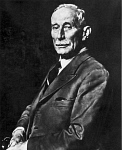Hubert Cecil Booth
| Hubert Cecil Booth | |
|---|---|
 |
|
| Born |
4 July 1871 Paris, France |
| Died | 14 January 1955 (aged 83) Croydon, England |
| Nationality | British |
| Education | City and Guilds Institute, London |
| Engineering career | |
| Discipline | Civil engineer |
| Institutions | Institution of Civil Engineers |
| Significant advance | Invented vacuum cleaner |
Hubert Cecil Booth (4 July 1871 – 14 January 1955) was a British engineer known for inventing one of the first powered vacuum cleaners.
He also designed Ferris wheels,suspension bridges and factories. Later he became Chairman and Managing Director of the British Vacuum Cleaner and Engineering Co.
Booth was born in Paris, France, although his family moved to Gloucester when he was 2 months old. He was educated at Gloucester College and Gloucester County School under headmaster Reverend H. Lloyed Brereton. In 1889 he entered the Central Technical College, City and Guild, London after passing the entrance examination. He completed a three-year course in civil engineering and mechanical engineering under Professor William Cawthorne Unwin FRS. He completed the Diploma of Associateship (ACGI), coming second in the engineering department. He became a student of the Institution of Civil Engineers.
In December 1892 he entered the drawing office of Messrs Maudslay Sons & Field, Lambeth, London under Mr Charles Sells, as a civil engineer. In this capacity he designed bridges and large ferris wheels for amusement parks in London, Blackpool, Paris, and Vienna. He also worked on the design of engines for Royal Navy battleships.
Booth is known for introducing one of the first powered vacuum cleaners. Before Booth introduced his version of the vacuum cleaner, cleaning machines blew or brushed dirt away, instead of sucking it up. As Booth recalled decades later, in 1901 he attended "a demonstration of an American machine by its inventor" at the Empire Music Hall in London. The inventor is not named, but Booth's description of the machine conforms fairly closely to American inventor John S. Thurman blown air design. Booth watched a demonstration of the device, which blew dust off the chairs, and thought that "...if the system could be reversed, and a filter inserted between the suction apparatus and the outside air, whereby the dust would be retained in a receptacle, the real solution of the hygienic removal of dust would be obtained." He tested the idea by laying a handkerchief on the seat of a restaurant chair, putting his mouth to the handkerchief, and then trying to suck up as much dust as he could onto the handkerchief. Upon seeing the dust and dirt collected on the underside of the handkerchief, he realized the idea could work.
...
Wikipedia
